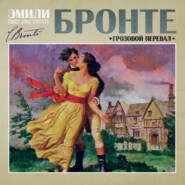По всем вопросам обращайтесь на: info@litportal.ru
(©) 2003-2025.
✖
Wuthering Heights
Автор
Год написания книги
2019
Настройки чтения
Размер шрифта
Высота строк
Поля
‘Where did she come from originally?’
‘Why, sir, she is my late master’s daughter; Catherine Linton was her maiden name. I nursed her, poor thing! I did wish Mr Heathcliff would remove here, and then we might have been together again.’
‘What, Catherine Linton!’ I exclaimed, astonished. But a minute’s reflection convinced me it was not my ghostly Catherine. ‘Then,’ I continued, ‘my predecessor’s name was Linton?’
‘It was.’
‘And who is that Earnshaw, Hareton Earnshaw, who lives with Mr Heathcliff? are they relations?’
‘No; he is the late Mrs Linton’s nephew.’
‘The young lady’s cousin, then?’
‘Yes; and her husband was her cousin also – one, on the mother’s – the other, on the father’s side – Heathcliff married Mr Linton’s sister.’
‘I see the house at Wuthering Heights has “Earnshaw” carved over the front door. Are they an old family?’
‘Very old, sir, and Hareton is the last of them, as our Miss Cathy is of us – I mean, of the Lintons. Have you been to Wuthering Heights? I beg pardon for asking; but I should like to hear how she is?’
‘Mrs Heathcliff? she looked very well, and very handsome; yet, I think, not very happy.’
‘Oh dear, I don’t wonder! And how did you like the master?’
‘A rough fellow, rather, Mrs Dean. Is not that his character?’
‘Rough as a saw-edge, and hard as whinstone! The less you meddle with him the better.’
‘He must have had some ups and downs in life to make him such a churl. Do you know anything of his history?’
‘It’s a cuckoo’s, sir – I know all about it; except where he was born, and who were his parents, and how he got his money, at first – And Hareton has been cast out like an unfledged dunnock – The unfortunate lad is the only one, in all this parish, that does not guess how he has been cheated!’
‘Well, Mrs Dean, it will be a charitable deed to tell me something of my neighbours – I feel I shall not rest, if I go to bed; so, be good enough to sit and chat an hour.’
‘Oh, certainly, sir! I’ll just fetch a little sewing, and then I’ll sit as long as you please; but you’ve caught cold, I saw you shivering, and you must have some gruel to drive it out.’
The worthy woman bustled off, and I crouched nearer the fire: my head felt hot, and the rest of me chill: moreover I was excited, almost to a pitch of foolishness, through my nerves and brain. This caused me to feel, not uncomfortable, but rather fearful, as I am still, of serious effects from the incidents of today and yesterday.
She returned presently, bringing a smoking basin, and a basket of work; and, having placed the former on the hob, drew in her seat, evidently pleased to find me so companionable.
Before I came to live here, she commenced, waiting no further invitation to her story, I was almost always at Wuthering Heights; because my mother had nursed Mr Hindley Earnshaw, that was Hareton’s father, and I got used to playing with the children – I ran errands too, and helped to make hay, and hung about the farm ready for anything that anybody would set me to.
One fine summer morning – it was the beginning of harvest, I remember – Mr Earnshaw, the old master, came down stairs, dressed for a journey; and, after he had told Joseph what was to be done during the day, he turned to Hindley, and Cathy, and me – for I sat eating my porridge with them – and he said, speaking to his son,
‘Now, my bonny man, I’m going to Liverpool, today…What shall I bring you? You may choose what you like; only let it be little, for I shall walk there and back; sixty miles each way, that is a long spell!’
Hindley named a fiddle, and then he asked Miss Cathy; she was hardly six years old, but she could ride any horse in the stable, and she chose a whip.
He did not forget me, for he had a kind heart, though he was rather severe, sometimes. He promised to bring me a pocketful of apples and pears, and then he kissed his children good-bye, and set off.
It seemed a long while to us all – the three days of his absence – and often did little Cathy ask when he would be home. Mrs Earnshaw expected him by supper-time, on the third evening; and she put the meal off hour after hour; there were no signs of his coming, however, and at last the children got tired of running down to the gate to look – Then it grew dark, she would have had them to bed, but they begged sadly to be allowed to stay up; and, just about eleven o’clock, the door-latch was raised quietly and in stept the master. He threw himself into a chair, laughing and groaning, and bid them all stand off, for he was nearly killed – he would not have such another walk for the three kingdoms.
‘And at the end of it, to be flighted to death!’ he said, opening his great-coat, which he held bundled up in his arms, ‘See here, wife; I was never so beaten with anything in my life; but you must e’en take it as a gift of God; though it’s as dark almost as if it came from the devil.’
We crowded round, and, over Miss Cathy’s head, I had a peep at a dirty, ragged, black-haired child; big enough both to walk and talk – indeed, its face looked older than Catherine’s – yet, when it was set on its feet, it only stared round, and repeated over and over again some gibberish that nobody could understand. I was frightened, and Mrs Earnshaw was ready to fling it out of doors: she did fly up – asking how he could fashion to bring that gipsy brat into the house, when they had their own bairns to feed, and fend for? What he meant to do with it, and whether he were mad?
The master tried to explain the matter; but, he was really half dead with fatigue, and all that I could make out, amongst her scolding, was a tale of his seeing it starving, and houseless, and as good as dumb in the streets of Liverpool where he picked it up and inquired for its owner – Not a soul knew to whom it belonged, he said, and his money and time, being both limited, he thought it better to take it home with him, at once, than run into vain expenses there; because he was determined he would not leave it as he found it.
Well, the conclusion was that my mistress grumbled herself calm; and Mr Earnshaw told me to wash it, and give it clean things, and let it sleep with the children.
Hindley and Cathy contented themselves with looking and listening till peace was restored: then, both began searching their father’s pockets for the presents he had promised them. The former was a boy of fourteen, but when he drew out what had been a fiddle, crushed to morsels in the great-coat, he blubbered aloud, and Cathy, when she learnt the master had lost her whip in attending on the stranger, showed her humour by grinning and spitting at the stupid little thing, earning for her pains a sound blow from her father to teach her cleaner manners.
They entirely refused to have it in bed with them, or even in their room, and I had no more sense, so, I put it on the landing of the stairs, hoping it might be gone on the morrow. By chance, or else attracted by hearing his voice, it crept to Mr Earnshaw’s door and there he found it on quitting his chamber. Inquiries were made as to how it got there; I was obliged to confess, and in recompense for my cowardice and inhumanity was sent out of the house.
This was Heathcliff’s first introduction to the family: on coming back a few days afterwards, for I did not consider my banishment perpetual, I found they had christened him ‘Heathcliff’; it was the name of a son who died in childhood, and it has served him ever since, both for Christian and surname.
Miss Cathy and he were now very thick; but Hindley hated him, and to say the truth I did the same; and we plagued and went on with him shamefully, for I wasn’t reasonable enough to feel my injustice, and the mistress never put in a word on his behalf, when she saw him wronged.
He seemed a sullen, patient child; hardened, perhaps, to illtreatment: he would stand Hindley’s blows without winking or shedding a tear, and my pinches moved him only to draw in a breath, and open his eyes as if he had hurt himself by accident, and nobody was to blame.
This endurance made old Earnshaw furious when he discovered his son persecuting the poor, fatherless child, as he called him. He took to Heathcliff strangely, believing all he said (for that matter, he said precious little, and generally the truth), and petting him up far above Cathy, who was too mischievous and wayward for a favourite.
So, from the very beginning, he bred bad feeling in the house; and at Mrs Earnshaw’s death, which happened in less than two years after, the young master had learnt to regard his father as an oppressor rather than a friend, and Heathcliff as a usurper of his parent’s affections, and his privileges, and he grew bitter with brooding over these injuries.
I sympathised awhile, but, when the children fell ill of the measles and I had to tend them, and take on me the cares of a woman, at once, I changed my ideas. Heathcliff was dangerously sick, and while he lay at the worst he would have me constantly by his pillow; I suppose he felt I did a good deal for him, and he hadn’t wit to guess that I was compelled to do it. However, I will say this, he was the quietest child that ever nurse watched over. The difference between him and the others forced me to be less partial: Cathy and her brother harassed me terribly: he was as uncomplaining as a lamb; though hardness, not gentleness, made him give little trouble.
He got through, and the doctor affirmed it was in a great measure owing to me, and praised me for my care. I was vain of his commendations, and softened towards the being by whose means I earned them, and thus Hindley lost his last ally; still I couldn’t dote on Heathcliff, and I wondered often what my master saw to admire so much in the sullen boy who never, to my recollection, repaid his indulgence by any sign of gratitude. He was not insolent to his benefactor; he was simply insensible, though knowing perfectly the hold he had on his heart, and conscious he had only to speak and all the house would be obliged to bend to his wishes.
As an instance, I remember Mr Earnshaw once bought a couple of colts at the parish fair, and gave the lads each one. Heathcliff took the handsomest, but it soon fell lame, and when he discovered it, he said to Hindley,
‘You must exchange horses with me; I don’t like mine, and if you won’t I shall tell your father of the three thrashings you’ve given me this week, and show him my arm, which is black to the shoulder.’
Hindley put out his tongue, and cuffed him over the ears.
‘You’d better do it, at once,’ he persisted, escaping to the porch (they were in the stable): ‘you will have to, and if I speak of these blows, you’ll get them again with interest.’
‘Off, dog!’ cried Hindley, threatening him with an iron weight, used for weighing potatoes and hay.
‘Throw it,’ he replied, standing still, ‘and then I’ll tell how you boasted that you would turn me out of doors as soon as he died, and see whether he will not turn you out directly.’
Hindley threw it, hitting him on the breast, and down he fell, but staggered up immediately, breathless and white, and had not I prevented it, he would have gone just so to the master, and got full revenge by letting his condition plead for him, intimating who had caused it.
‘Take my colt, gipsy, then!’ said young Earnshaw, ‘And I pray that he may break your neck; take him, and be damned, you beggarly interloper! and wheedle my father out of all he has: only, afterwards, show him what you are, imp of Satan – And take that, I hope he’ll kick out your brains!’
Heathcliff had gone to loose the beast, and shift it to his own stall – He was passing behind it, when Hindley finished his speech by knocking him under its feet, and without stopping to examine whether his hopes were fulfilled, ran away as fast as he could.
I was surprised to witness how coolly the child gathered himself up, and went on with his intention, exchanging saddles and all; and then sitting down on a bundle of hay to overcome the qualm which the violent blow occasioned, before he entered the house.
I persuaded him easily to let me lay the blame of his bruises on the horse; he minded little what tale was told since he had what he wanted. He complained so seldom, indeed, of such stirs as these, that I really thought him not vindictive – I was deceived, completely, as you will hear.

















